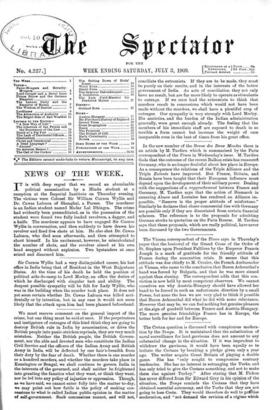We must reserve comment on the general import of the
crime, but one thing must be said at once. If the perpetrators and instigators of outrages of this kind think they are going to destroy British rule in India by assassination, or drive the British people into panic-stricken reprisals, they are very much mistaken. Neither the British people, the British Govern- ment, nor the able and devoted men who constitute the Indian Civil Service and the officers of the Indian Army and British Army in India will be deflected by one hair's-breadth from their duty by the fear of death. Whether there is one murder or a hundred murders, and whether the murders take place in Kensington or Bengal, we shall continue to govern India in the interests of the governed, and shall neither be frightened into granting the fanatics what they want, or think they want, nor be led into any policy of injustice or oppression. Though, as we have said, we cannot enter fully into the matter to-day, we may point out how futile is the policy of making con- cessions to what is called Indian public opinion in the matter of self-government. Such concessions cannot, and will not,
conciliate the extremists. If they are to be made, they must be purely on their merits, and in the interests of the better government of India. As acts of conciliation they not only have no result, but are far more likely to operate as stimulants to outrage. If we once lead the extremists to think that murders result in concessions which would not have been made without the murders, we shall have a plentiful crop of outrages. Our sympathy is very strongly with Lord Morley. His anxieties, and the burden of the Indian administration generally, were great enough already. The feeling that the members of his immediate staff are exposed to death in so terrible a form cannot but increase the weight of care inseparable even in the best of times from his great office.














































 Previous page
Previous page